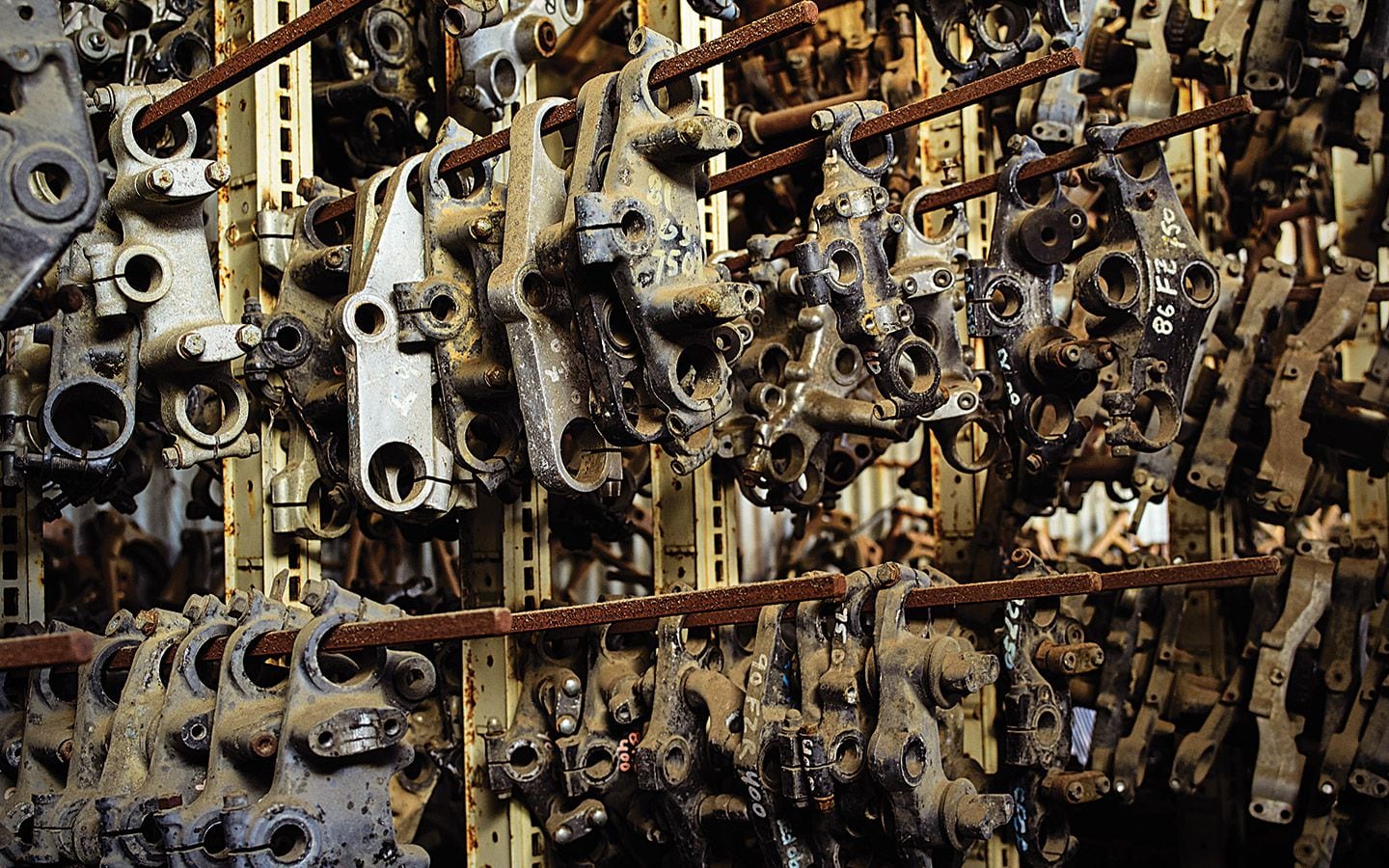D
eath’s door looks like the sun-bleached corrugated steel of every other old industrial building off the Avenue. The condemned wait there while their paperwork clears. A motley crew of Vespas and Kawasakis and Hondas with caved-in fairings and twisted forks and dangling mirrors. Threading his way through the tangle is Greg Sussex, the pleasantly smiling executioner of thousands of motorcycles. Tri-County Motorcycle Salvage in Ventura, California, stretches through a handful of buildings, two levels, and an old school bus. Broad awnings shade an endless collection of factory headers with attached mufflers. Grass grows through head-high stacks of spoked wheels and crumbling tires, and a gentle breeze through the rafters taps airboxes against each other with the hollow clatter of dry bones.
Salvage operations like Tri-County are rare and getting rarer. Today you’d probably stumble into business with Sussex on eBay, or you might reach him by phone. “Guys try 15 numbers before they find a place that’s still in business,” he laughs. Even if you walked in—like I did when I was a college student trying desperately to afford the parts I was sanding off a long-suffering 1988 Honda Hawk—you still wouldn’t see the good stuff. There are insurance mandates and fire codes that keep the public from poking around the library stacks of deceased machines. Crossing a flexing catwalk between two-story stacks of ’90s bike tanks and ’80s speedometers, those policies seem unusually sensible.
Persuade Sussex to show you the back rooms and you’re greeted by mountains of the familiar but indistinguishable. It’s like seeing friends of your parents on the street. Here and there is a bright color. The baby blue of a Vespa. The purples and whites and greens of a certain era of Kawasaki. Let your eye do the driving and it gravitates to things you know. A stock DRZ exhaust. Beautiful Interceptor fairings. Rein it in and look for details, and what you find can be more desirable. Seemingly perfect pieces of a Ducati Paso. RD tanks. CR125 engines and whole shifter karts waiting to give them a home.
Motorcycle writer Kevin Cameron once declared an organized workbench the sign of a disorganized mind. He meant it as a hedge against prettily painted outlines of wrenches on pegboards, an encouragement toward thought and practice rather than decorative neatness. When you see the inside of Tri-County, you wonder if Sussex has the most organized mind of all.
At its peak in the ’90s, Tri-County was buying and dismantling about a bike a day. It seems like an impossible volume until you see the triple clamps hung feet deep on long racks, or the neatly organized forks that fill cubbyholes that stretch from floor to ceiling, or the dirt bike fenders that nestle one into the next making yard-long rainbows of lurid color.
The yard made perfect sense here in 1986. Not so long ago, Ventura Avenue was all oil patch and industry. Shell struck it big up the Avenue before the war. There were refineries and miles of drilling rigs. And when the boom started to cool and the refinery shuttered, and smaller operators shipped off to Texas or Alaska, little shops like Tri-County filled the gaps and made a home.
If there’s sense to be made of the sprawl, it’s private. Sussex counted on help dismantling his machines, but this week, and the last and the next and maybe more, he’s working alone in the stacks. And, perhaps because of it, there are places where the forces of capitalism have overcome the forces of order. Gold Wing blocks have been shifted to the floor in the effort to mine something from them, and then left to form a kind of thrombosis in the path of further commerce. A shopping cart laden with heads and valves and other important things will travel that far into the stacks, and no further. And then it will acquire a layer of things set aside for later. And, eventually, Sussex will bend his lean frame over this clogged artery and peer into the darkness with his flashlight and have to do the math, whether finding a $15 or $30 part is worth attending to those hours of deferred organization.
It’s painful seeing all those good things bound up. Knowing that every starter motor and carburetor sold is a hedge against the steady creep of new condos up the Avenue. Find a buyer and every $30 treasure is important, a nudge keeping one more motorcycle on the road and the doors of Tri-County clogged with derelict machines. Stop finding those buyers and the scrap man will pay cents on the pound for that precious metal, all day long.
You’d think there’d be a big score laid away in those mountains of parts. CBX exhausts and other unobtanium. Sussex is quick to disabuse that notion. “I wouldn’t still have the stuff that’s worth something. I’m not going to be here in 30 years, right? So, I just look at how to maximize profits for the next seven years, you know.” That means eBay, online listings in this, the most analog of places. “We kind of had to reinvent things, and this is going to be the last time I reinvent it. Next time things need changing, I’ll be gone. I’ll have to be done.”
Today the bay where Tri-County drains, guts, and fillets bikes is dotted in the oily remains of a Ducati Super Sport.
“We got it from a guy that was almost killed on it,” Sussex says as he steps around the engine. He’s tall, lanky. Made for fitting down the crowded aisles, for stretching his spiderlike legs over stacked cases or half-packed boxes. “I don’t hear the stories, I don’t usually want to hear it because, well, there’s a lot of bad stories, you know?”
A bit of melancholy fades his smile. “Sometimes you can’t help but hear it, you know? ‘My son was killed on this thing,’ or something like this. Sometimes you know the accident, you know the guy.”
It’s motorcycling. It’s dangerous, and sometimes delicate, and you’ve been there too, and you do know. And for an uncomfortable minute, it’s quiet and weirdly religious, the rows of engines and final drives in deep shadow, and the soft, dusty, oily floor a mechanical catacomb around you.
Then the phone rings and business crowds out the mood. Sussex pulls a cordless from a sparse tool belt where it lives with his flashlight and hunts off into the darkness.











/cloudfront-us-east-1.images.arcpublishing.com/octane/L6RJ6OTCDN7L4YWFHXADRP5K5E.jpg)
/cloudfront-us-east-1.images.arcpublishing.com/octane/7O53TAXHGPU4AVBDCNE6OOQXEU.jpg)
/cloudfront-us-east-1.images.arcpublishing.com/octane/OYISJA5L5CH4A6USXLD5B4FOHE.jpg)
/cloudfront-us-east-1.images.arcpublishing.com/octane/TG5GYJOKWAEHJTK4K7VYLM7DFU.jpg)
/cloudfront-us-east-1.images.arcpublishing.com/octane/L3TUL7NEBMKDSNCQHIQHPU6T24.jpg)
/cloudfront-us-east-1.images.arcpublishing.com/octane/OKWOJWAKP5EP3OACCRRWPCIX2Q.jpg)
/cloudfront-us-east-1.images.arcpublishing.com/octane/2WF3SCE3NFBQXLDNJM7KMXA45E.jpg)
/cloudfront-us-east-1.images.arcpublishing.com/octane/G4MG6OUCJNBSHIS2MVVOTPX65E.jpg)
/cloudfront-us-east-1.images.arcpublishing.com/octane/IIGGWFOTOJGB7DB6DGBXCCMTDY.jpg)
/cloudfront-us-east-1.images.arcpublishing.com/octane/QSTCM6AVEZA5JJBUXNIQ3DSOF4.jpg)
/cloudfront-us-east-1.images.arcpublishing.com/octane/U4I7G625B5DMLF2DVIJDFZVV6M.jpg)
/cloudfront-us-east-1.images.arcpublishing.com/octane/B6XD6LS6IVCQPIU6HXDJSM3FHY.jpg)
/cloudfront-us-east-1.images.arcpublishing.com/octane/ICL63FEDDRDTTMINYICCEYGMDA.jpg)
/cloudfront-us-east-1.images.arcpublishing.com/octane/FCGZHQXRBZFLBAPC5SDIQLVF4I.jpg)
/cloudfront-us-east-1.images.arcpublishing.com/octane/WNOB6LDOIFFHJKPSVIWDYUGOPM.jpg)

/cloudfront-us-east-1.images.arcpublishing.com/octane/X33NU3E525ECRHXLNUJN2FTRKI.jpg)
/cloudfront-us-east-1.images.arcpublishing.com/octane/6KKT5NNL2JAVBOXMZYS5ZO76YA.jpg)
/cloudfront-us-east-1.images.arcpublishing.com/octane/J5RKG5O455GMPGQRF2OG6LRT7A.jpg)
/cloudfront-us-east-1.images.arcpublishing.com/octane/GX2CIZKQVRH2TATDM26KFG2DAE.jpg)
/cloudfront-us-east-1.images.arcpublishing.com/octane/ZWIDYSAKQZHD5BHREMQILXJCGM.jpg)
/cloudfront-us-east-1.images.arcpublishing.com/octane/CYUHJZCTSJCH3MRAQEIKXK7SCQ.jpg)
/cloudfront-us-east-1.images.arcpublishing.com/octane/LKOFINY56FCXJCANJ5M7ZDQUBY.jpg)
/cloudfront-us-east-1.images.arcpublishing.com/octane/4NBPDACMWJH63JQYJVK3QRBDZI.jpg)
/cloudfront-us-east-1.images.arcpublishing.com/octane/KKHQHRR3FJGX7H2IPU6RALMWG4.jpg)

/cloudfront-us-east-1.images.arcpublishing.com/octane/5IOFS5JAE5FOXMNA23ZRAVVYUU.jpg)
/cloudfront-us-east-1.images.arcpublishing.com/octane/CGXQ3O2VVJF7PGTYR3QICTLDLM.jpg)
